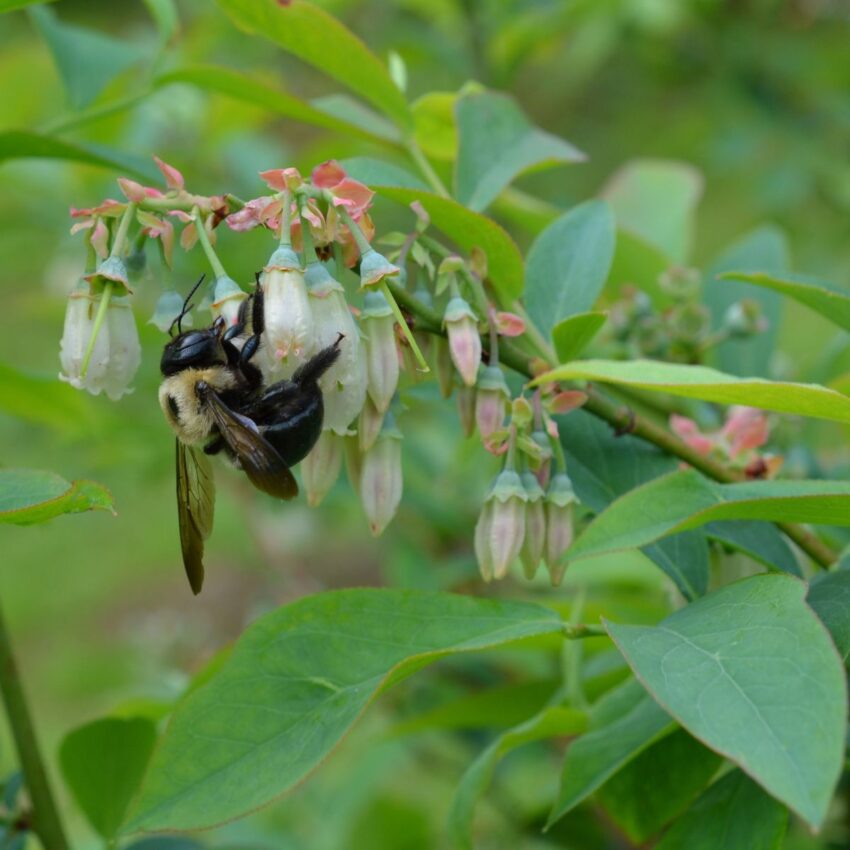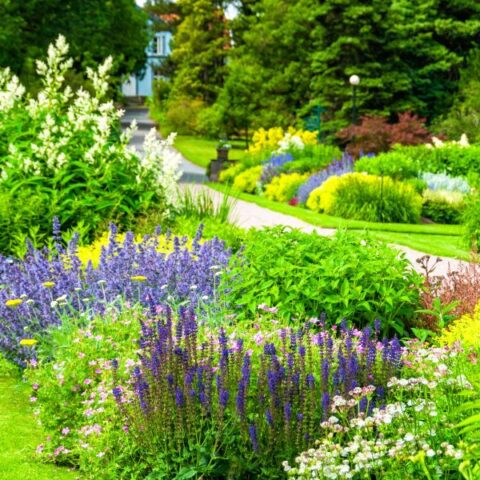Growing plants that benefit blueberry bushes (aka companion planting) is a fantastic way to maximize your berry yield through pollinators, add visual appeal to your garden or deck, and get the most out of your available space.
But… which species play nice with blueberry bushes, and which don’t? Let’s find out all about blueberry companion planting!

This post may contain affiliate links, and you can read our disclosure information here–
Jump to: Benefits of Blueberry Companion Plants | Blueberry Companion Planting in Containers | Blueberry Companion Planting in Garden Plots | Which plants NOT to plant near blueberries
What Exactly is Companion Planting?
Companion planting refers to planting two (or more) plants near each other for the benefit of one of those plants or both. The benefit can be one way or mutual.
3 Key Benefits of Companion Planting with Blueberries
#1: Increases the Fruit Yield
First and most importantly, some plants are great at attracting pollinators like bees, which will happily take a detour to visit your blueberry bushes as well. That means more pollinated flowers, a higher yield, and bigger berries.
Many plant nurseries will tell you that some blueberry varieties are self-pollinating and you only need one variety to get berries.
While some varieties of blueberry plants are considered self-pollinating, diversifying the blueberry plant varieties and planting different cultivars near each other will increase the yield of each plant if there are bees or pollinators around.

#2: Visual Appeal:
Secondly, although a blueberry bush is quite decorative by itself, you can complement its good looks by combining it with different plants, whether in the garden or containers.
We’ll also discuss nice ground cover options that can grow alongside blueberries, to prevent encroaching grass and weeds.
Grass is particularly troublesome as a ground cover around blueberry plants, as it takes up the soil nutrients and is difficult to eradicate because of the root system.

#3: Space Saving
Last but certainly not least, I am a fan of maximizing the use I get out of every square foot of land I have available. I’m sure my city-dwelling readers especially will agree!
Arranging blueberry bushes in containers near other berries or herbs in containers is a fantastic way to make the most of a balcony, deck or small space.
You can even choose plants that will complement blueberries in the kitchen: I’ll share my idea for a mini blueberry cocktail garden in the section below for example.
Blueberry Companion Plants in Container Gardens
On a balcony or deck, especially in an urban environment, it can sometimes be difficult to attract enough pollinators.
Your potted blueberry bush needs visits from bees and other bugs while it is in bloom, or the flowers will not develop into berries, so it’s important to create a welcoming environment for them.
Tip: Combine potted blueberry bushes with species that bloom at the same time to attract pollinators for a bigger harvest.
As a bonus, you get to choose plants with pretty blooms, such as:
- Fuchsia: amazing flowers, suitable for containers, and likes acidic soil. It’s a winner!
- Impatiens (touch-me-not): gorgeous blooms and pollinators love ’em.
- Calluna (Heather): one of my favorite options. Choose different colors for an amazing display.
- Erica: similar to heather, this low-growing shrub plays nice with blueberries and will attract an abundance of bees.
- Herbs: there are loads of suitable options that pollinators love, including thyme, mint, lavender, parsley, lemon balm, sage, trailing rosemary, dill, chives, and more. Get an herb variety pack and bees will flock to your garden!

Edible Companion Plants for Blueberries in Pots
We’ve already touched upon a few edible companion plants for blueberries above, like various herbs. But it doesn’t stop there!
Many flowers and other edible plants that combine well with blueberry shrubs include:
- Trailing nasturtiums: lovely flowers that are edible too. Use them in salads as a pretty garnish and for a kick of peppery flavor.
- Trailing alpine strawberries: great for pots, as they stay smaller than normal strawberry plants. Lush, wild strawberry flavor.
- Lavender: gorgeous to look at, pollinators love it, and it can be used in all sorts of recipes. Many other herbs are also suitable.
- Other berries: lingonberries, cranberries, and alpine currants appreciate the same conditions as blueberries and can be grown in containers.
- Salad greens: if you’ve got ground space available in your blueberry planters, why not? Get a lettuce variety pack to fill up the pot and enjoy in salads.

Cocktail Gardens with Blueberry Companion Plants
If you’re looking for blueberry companion plants that aren’t just pretty but also useful, one of my favorite ideas is to grow a potted blueberry cocktail garden.
I love a good blueberry mojito, for example, and it just so happens to be that blueberries and mint can be grown in a single container!
Other herbs that work well in blueberry cocktails and can grow alongside blueberry shrubs include:
- Lemon verbena to add to a spiked blueberry lemonade.
- Lemon balm works well too.
- (Alpine) strawberries for a berry medley mojito.
- Basil, including fancy varieties like lemon basil, for a blueberry-basil vodka tonic.
- Lavender for a simple blueberry lavender vodka soda.
- (Pineapple) Sage may not be the first thing you think of for a cocktail, but don’t knock it ’till you’ve tried it!
- Tarragon’s anise flavor combines very well with tangy and sweet blueberries in a refreshing spritzer.

Blueberry Companion Planting for the Backyard Garden
Growing your blueberry shrubs in the garden rather than a pot on the deck or balcony? That’s good news, as it greatly increases your options when it comes to companion planting.
Without the size constraints and with the improved drainage in healthy garden soil, you’ll only have to focus on finding species that have similar soil and light requirements. Let’s have a look at some of our favorites here at our farm!
Tip: Remember 2 things! Companion plants for blueberries should have similar sunlight preferences (6 hours or more per day). Also, although blueberry bushes need fairly acidic soil, you can acidify the soil of a 3-foot hole, especially for them, and plant companion plants that don’t need acid soil nearby.

Pollination Options for Blueberry Plants in Garden Plots
All of the pollinator favorites we discussed in the section on potted plants above still apply for the garden.
Additional options that grow a bit too big for most pots include:
- Yarrow: combine differently colored cultivars for a cheerful display that will be buzzing with bees, butterflies, wasps, hoverflies, and a variety of beetles.
- Non-trailing rosemary: these shrubs can grow to up to 5ft tall. Bees love them, and so do most humans, so it’s a win-win.
- Borage: this edible flower is nice to look at and very attractive to pollinators. Another absolute winner for blueberry companion planting in my book.
- Bee balm: I think the name says it all! If you live in an area where they are native, you may even attract hummingbirds with this plant.
- Anise Hyssop: another bee magnet, and those purple bottlebrush flowers just look lovely. It’s edible, too!
For Visual Appeal
Now that we’ve dropped the size constraints of pots, we can go a little crazy in the garden.
There are so many beautiful blueberry companion plants to consider!
Many of them are appreciated for their flowers, which means they can also double as pollinator magnets, although not all of them bloom at the same time as blueberries.
Here are a few of our personal favorites:
- Rhododendron: available in different flower colors, this abundant bloomer likes similar conditions to blueberries.
- Azalea: similar in looks, this one’s a good choice if a Rhododendron bush seems like it would grow a bit too large for your garden.
- Camellia: yes, that includes the tea plant, Camellia sinensis! I love their gorgeous, rose-like flowers.
- Holly: this classic Christmas plant does well in well-draining, rich but acidic soil, just like blueberries.
- Mountain laurel: another highly decorative, shrubby plant that’s similar to Rhododendrons and Azaleas, you’re sure to love mountain laurel’s delicate flowers.
- Japanese Andromeda: this is a real eye-catcher, with elongated bunches of tiny bell-shaped blooms.
- Sweet pepperbush: a little smaller than the aforementioned plants, the sweet pepperbush nonetheless steals the show with its bottlebrush flowers.

For Ground Cover
Leave no space unplanted!
Did you know? Adding ground cover around your blueberries helps prevent weeds and grass from taking hold, assists in retaining soil moisture, and allows you to make use of all the space you’ve got to work with.
A few low, spreading plants that can grow alongside blueberries include:
- Strawberries: normal, alpine, heirloom, wild… whichever you prefer.
- Red clover: a lovely, low-growing option that blooms wonderfully.
- Marjoram: another multifunctional champion that works well as ground cover, attracts bees, and happens to be a fantastic choice to season meat dishes as well.
- Creeping thyme: stays lower than regular thyme, but still smells and tastes great.
- Periwinkle: this creeper doesn’t mind being shaded by taller plants, and it produces lovely flowers. It can be a bit invasive, though.
- Wintergreen: I love its pretty red berries!

What NOT to Grow near Blueberry Plants
As you’ve hopefully concluded by now, there are loads of great blueberry companion plants out there.
But what about the opposite? Are there any species you should keep away from your blueberry shrubs?
Although there aren’t exactly plants that will outright kill your blueberries with their mere presence, there are some that you may want to plant elsewhere:
- Nightshades like tomatoes and peppers have pretty different soil requirements, they blossom at different times and they don’t prefer acidic soils. While it can be done, they are not the best companions.
- Walnut trees emit a chemical called juglone, which is toxic to blueberry bushes.
- Grass can be problematic as a groundcover, as it tends to spread and take over blueberry plants, depleting the soil nutrients that they need.

If you like my articles about cooking and gardening, subscribe to my weekly newsletter, where I share free recipes and gardening tutorials.
FAQs About Blueberry Companion Plants
Yes, these two work very well together. Strawberries make for great edible ground cover under your blueberry bushes.
No, these two are not ideal together. Asparagus needs more alkaline soil and uses up a lot of nutrients.
No, raspberries like more alkaline soil, and they will spread into the blueberry area. The blueberry hole should be kept acidic and free of other plant competition.
It’s not the first combination I’d think of, but they should be fine together. Just be sure to keep the blackberries under control as they are brambles like raspberries and will compete with nutrients if they grow into the hole specific to the blueberry plant.


Are Passion flower vines and blueberries a safe combination? I cannot find info about this anywhere but your suggestions here are great ideas as to what grows well with blueberries